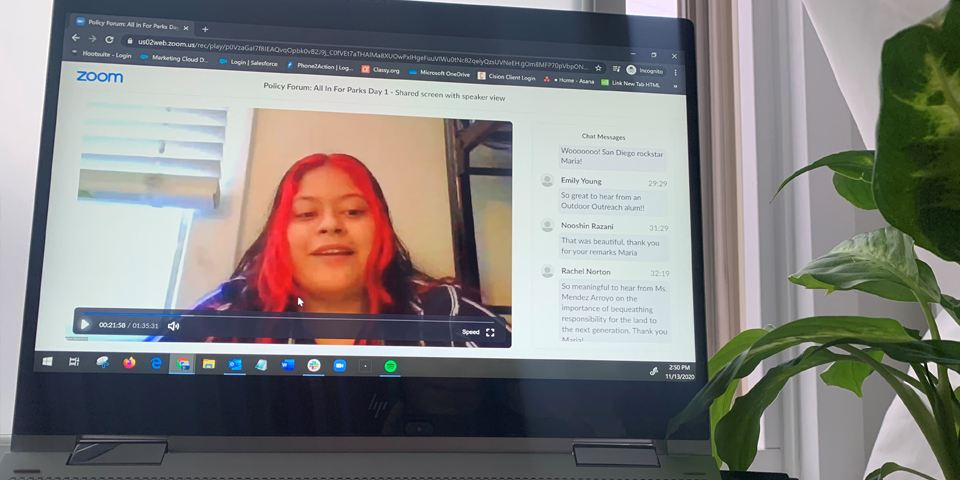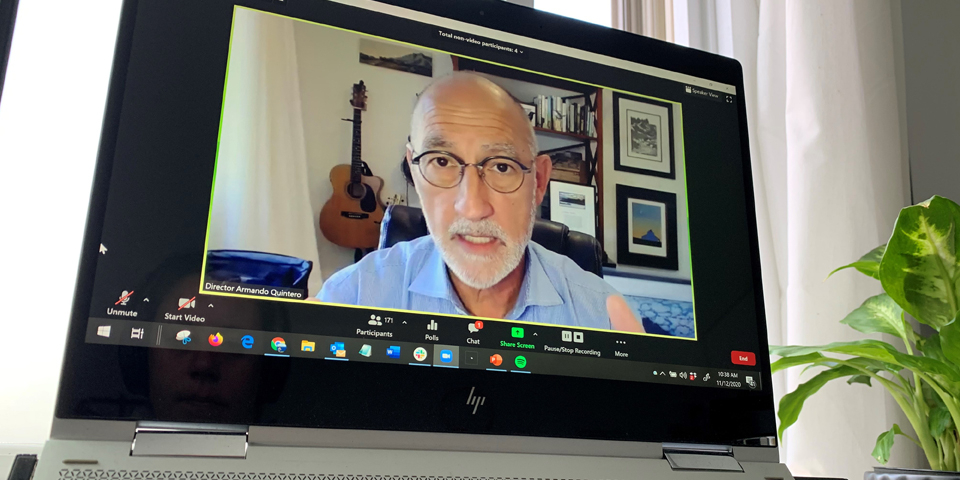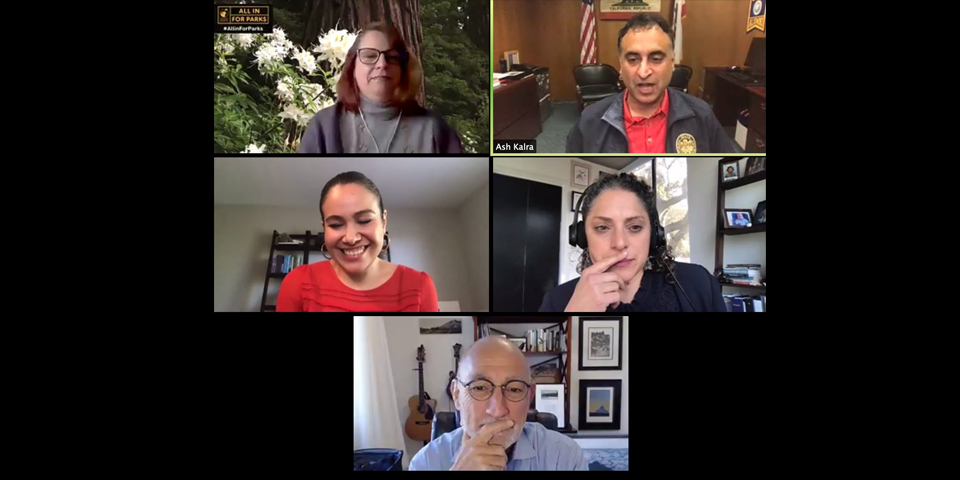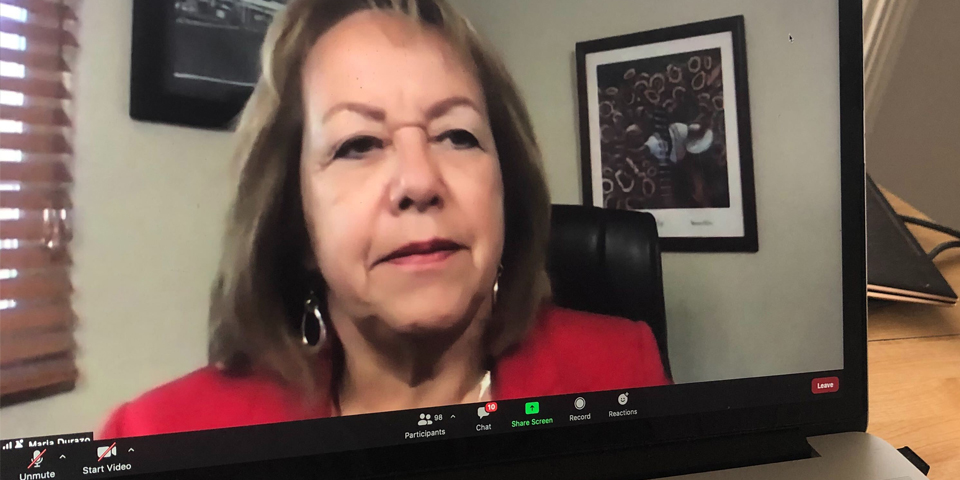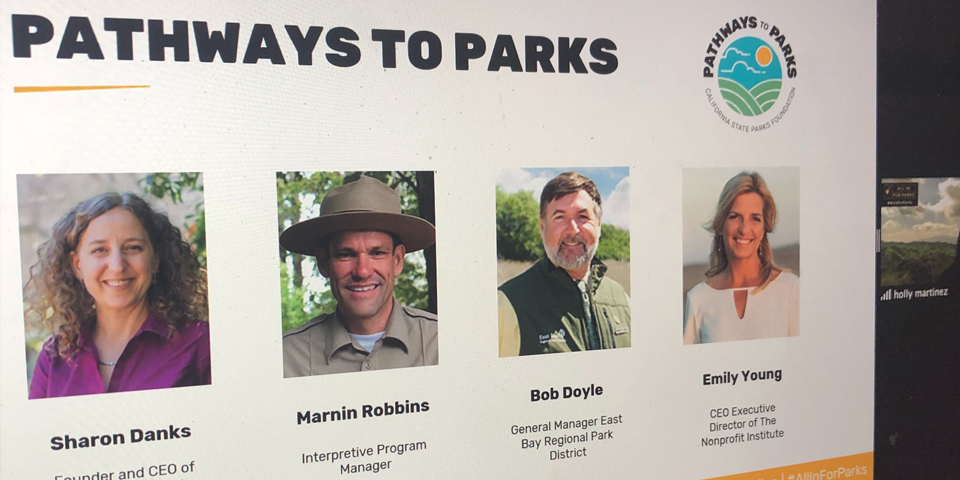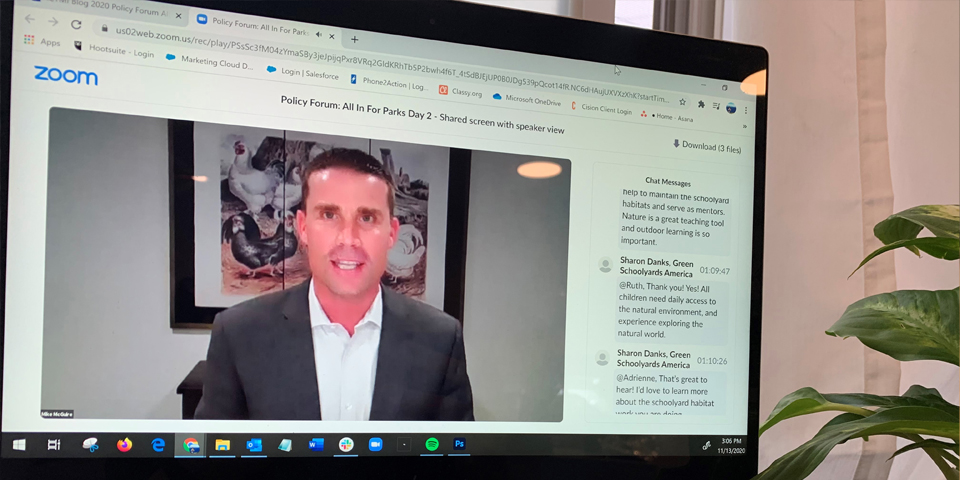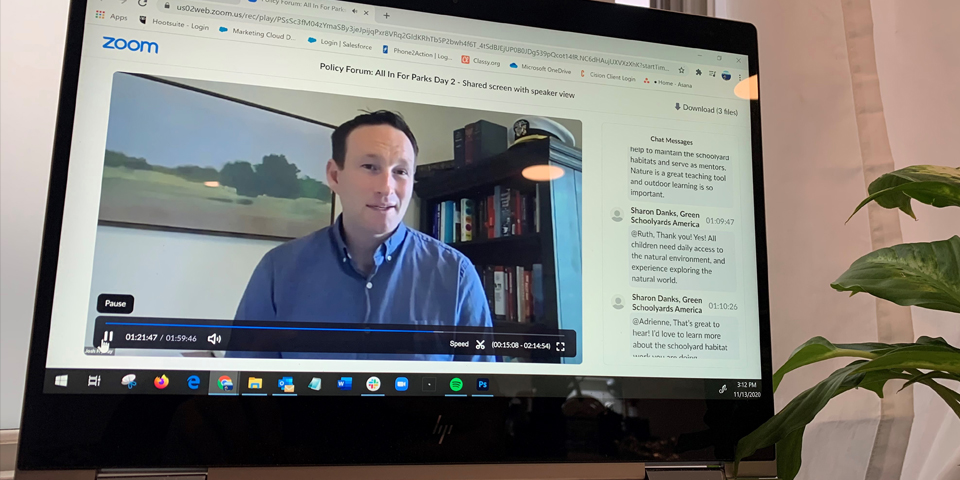This week, California State Parks Foundation hosted its second annual Policy Forum: All In For Parks. The two-day event brought together leaders in parks, policy, youth access, public health, climate, and beyond to take on some of the most urgent issues facing our state parks.
Day One: The Future of State Parks
Kicking off the event, California’s First Partner Jennifer Siebel Newsom welcomed guests and shared words of encouragement for the work ahead: “Together, we must continue to commit to the fundamental principal that access to parks, outdoor experiences, and nature is a human right, not a privilege.”
From there, California State Parks Foundation’s Director of Programs and Advocacy, Holly Martinez and Board Member, Darry Sragow shared the findings of a new statewide poll. Conducted between August and September of 2020, the new polling data show that 85% of Californians believe state parks are an important part of everyday life. The poll also found that parents with young kids, Latinas, and millennials were more likely to say they visit parks to enjoy downtime with family.
After the polling results were shared, Outdoor Outreach graduate Maria Guadalupe Mendez Arroyo shared how her own experiences in the outdoors have made her want to protect these resources for the future. She shared her relationship with the outdoors saying, “being in the outdoors has helped me with anxiety and depression. It’s helped me deal with hard thoughts and just let go.” Her story was inspirational as she spoke to the transformational experiences Californians have in their parks. From there she introduced California State Parks Director Armando Quintero.
In his keynote address, newly appointed Director Armando Quintero laid out his vision for the future of state parks, stressing the importance of partnerships in rising to the challenge of the next century: climate change, equal access to the outdoors. “We want parks to be the places where all the stories of Californians are told. Whether they are the first generation of Californians or the 200th generation.”
Director Armando Quintero then joined California State Parks Foundation Executive Director Rachel Norton on a panel with Assemblymember Ash Kalra, Mayra Alvarez, President of The Children’s Partnership, and Doctor Nooshin Razani, Center for Nature and Health at UCSF Benioff Children’s Hospital Oakland.
The panel focused on the intersection of state parks and public health, recognizing there are far too many communities that do not have access to the outdoors. Assemblymember Ash Kalra spoke about his work to promote conservation, for the health of our climate and our people, and the need to center these efforts around equity and access to the outdoors.
“You can look at any of our biggest goals as a country... improving health contributes to every single one of those goals,” said Mayra Alverez. “The path toward equity must be the path toward health.” Furthermore, she went on to say that our limited definition of what contributes to health and wellbeing is part of the broken and outdated system that we can and must re-evaluate.
For healthcare practitioners, Dr. Nooshin Razani emphasized the need for a common language that we can truly integrate nature and medicine and the opportunity for our parks to be included as part of a holistic approach to individual care. The panelists all agreed, we need to have intentional investments that ensure we protect nature for future generations and allow youth an get outdoors today. This starts with resourcing parks so that they can meet community need, break down barriers to the outdoors, and realize their potential in human happiness and health.
To view a recording of Day 1, please click here.
Day Two: Pathways to Parks and Climate Resiliency
After a motivating and thought-provoking first day on the Future of State Parks, Day 2 was set to build off that momentum and dive deeper into conversations about issues parks and California is facing today.
Senator Maria Elena Durazo started off Day 2 sharing her own personal experience in parks, “when I go to the park with my granddaughters, there’s always a moment of learning something.” It was evident she had a personal connection to our parks, but also sees how parks can be a link to a healthier economy in California. Senator Durazo spoke to this saying, “We have to make sure that as we invest in a carbon-neutral economy, that provides workers and our youth with the necessary tools to thrive.”
After opening remarks by Senator Durazo, California State Parks Foundation’s Director of Programs and Advocacy, Holly Martinez kicked off the Pathways to Parks session. This panel focused on exploring solutions to support equal access to parks and the health benefits they provide for Californians. The panel included Emily Young, Executive Director of The Nonprofit Institute in the University of San Diego’s School of Leadership and Education Sciences and California State Parks Foundation Board member, Sharon Danks, CEO and Founder of Green Schoolyards America, Bob Doyle, General Manager of the East Bay Regional Park District, and Marnin Robbins, Interpretive Program Manager for the North Coast Redwoods District of California State Parks.
With COVID-19 this year, parks have been a haven for Californians, but it has also shown a spotlight on the inequities in access to these spaces for physical and mental health. Bob Doyle said, “right now, the public is speaking out about how essential parks are to their mental and physical health – and that’s wonderful.”
Emily Young spoke to what she is seeing at Silver Strand State Beach in Coronado, “when you look at park access, it’s very uneven.” Most visitors are of retirement age that are able to own an RV, costing over $100,000. That is who is primarily using the park and has access to it.
Not only is access to these places essential, but making visitor feel a sense of belonging and welcome may be equally important. Marnin Robbins, spoke to what his work to support greater representation in parks. “We’re diversifying who is the face of our park. We’re bringing in people from more diverse backgrounds and bringing in new perspectives.” Increasing inclusion in our state parks can foster stronger communities, where all Californians feel at home in their parks. In this way, Marnin said, “Park interpreters can be facilitators of democracy in action.”
Senator Mike McGuire started the Climate Resilience panel with energy and enthusiasm. Recognizing that part of the solution for climate resilient parks is to ensure Californians have more access to them, ensuring their protection and preservation in the future. “Today, we have the opportunity to innovate – and make state parks more relevant and more equal to everyone,” said Senator McGuire. Then making the connection, he asked the question “we need to teach kids about climate change, and what better classroom is there than state parks?” which sparked conversation among the panelists for this session.
The Senator was joined by Jay Chamberlin, Chief of State Parks’ Natural Resources Division, Josh Fryday, California’s Chief Service Officer, and Chris Santomero, Leadership Program Coordinator at Outdoor Outreach. Jay Chamberlin set a vision for state parks role within California, “I believe our state parks are a tapestry upon which we can really paint a vivid and sustainable picture for the future of California.”
Josh Fryday spoke to the power of people, and his confidence that Californians can come together to fight climate change in California. “We have to empower people to be part of the solution. We’re not powerless – we can do things to protect our home from wildfire and climate change.” He spoke of ways for us to mitigate the impacts of climate change, not only right now, but for future generations.
Perhaps Chris Santomero said it best when thinking about the future of parks, equitable access, and climate change, “when we look to the future of our parks, we need to look at our youth. We must foster a sense of stewardship, a sense of ownership, a sense of responsibility, and a motivation to engage with these spaces.”
To view a recording of Day 2, please click here.
We hope to continue to engage partners, members, volunteers, funders, and policymakers as we work to advance policy solutions in 2021 legislative session and with the administration. This event was a critical first step to reimagine what is possible with all the changes 2020 has brought, but the future for parks is looking bright as so many innovative and brilliant solutions have been brough to the table and we hope to see carried through for future generations.
